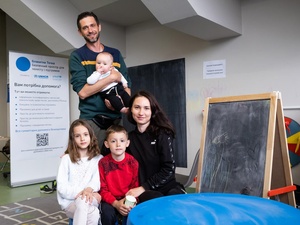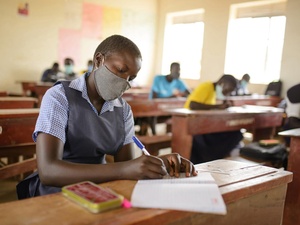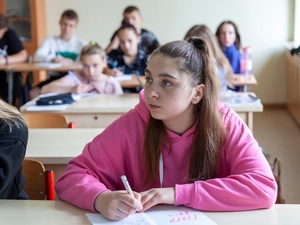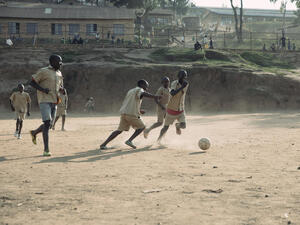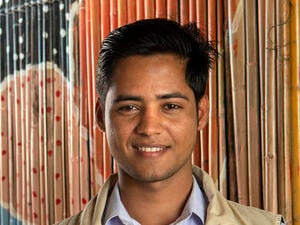UNHCR to expand sports programmes for refugee children
UNHCR to expand sports programmes for refugee children
22 May 2002
GENEVA - UNHCR is expanding sports programmes for children living in refugee camps around the world to a total of 16 countries by the end of this year. New projects will be funded by three of UNHCR's main sports donors and will focus mainly on Asia and Africa.
Over the last six years, UNHCR has partnered with Olympic Aid, the International Olympic Committee (IOC) and the Fédération Internationale de Volleyball to reach out, through sports, to an estimated 3.5 million refugee children in some 1,000 camps and settlements in Africa, Asia and Eastern Europe. The refugee agency is keen to develop more partnerships with sports-oriented donors to enable it to further expand sports programmes for the world's refugee children.
"We need to be aware that there are many refugee children who have never known the carefree joy of a simple childhood game or the sense of accomplishment that comes from teamwork," UN High Commissioner Ruud Lubbers told a specially convened Olympic Aid forum at the Salt Lake City winter games in February this year. "Many have simply forgotten how to be children. Play and teamwork can help heal their emotional scars and restore at least some semblance of normalcy in the otherwise alien environment of a refugee camp."
Out of an estimated 20 million refugees, displaced persons and other vulnerable groups around the world today, 50 per cent are children. Most of them have experienced traumatic forms of violence. The drama that made them refugees has often totally disrupted their traditional family and community structure. Organising regular, structured recreational activities such as team sports is a vital step in rebuilding a destroyed society and boosting the healing process.
Under the expanded sports programme for refugees, Olympic Aid is to establish projects in camps and settlements in six more countries - Pakistan, Eritrea, Guinea, Zambia, Democratic Republic of Congo and Thailand. Olympic Aid is an international association of athletes committed to promoting healthy sports and play as a right of all the world's children, including refugees. The association will send trained athletic coaches to selected refugee sites in these countries for a period of up to three years. The coaches will organise sports activities in the camps and also train youth and adults to enable them to manage the sports programmes by themselves.
Other sports projects funded by Olympic Aid and the International Olympic Committee (IOC) are already being run in ten countries across Asia, Africa and Eastern Europe - Benin, Côte d'Ivoire, Ghana, Tanzania, Uganda, Angola, Nepal, East Timor, Kenya and Tajikistan. The IOC is set to expand programmes in five of these countries and will prepare playing fields in refugee camps, purchase sports equipment and hire local trainers to coach young refugees.
Because of limited funding, UNHCR must devote its resources to life-sustaining programmes for refugees and is, therefore, unable to allocate its budget for sports programmes. It relies wholly on the current sports donors to enable it to run and expand sporting activities for refugees. UNHCR would like to establish new partnerships with sports-oriented donors so as to develop further its sports programmes in refugee camps.
Since 1996, the Fédération Internationale de Volleyball has sponsored annual sports activities in at least two UNHCR-run camps. The organisation sends hundreds of volleyballs and nets to camps and organises national volleyball players to coach refugees. Their sponsorship is expected to continue.
A few years ago, a Sudanese refugee woman in charge of a volleyball programme for girls in Kakuma refugee camp, Kenya, told a visiting IOC delegation, "Do not think you are doing good by sending knitting, sewing and basket-weaving materials down here for the girls. When they sit quietly and sew, they remember the horrors that made them refugees," the female refugee coach said. "They do not need sewing now, they desperately need the joyful therapy that only group sports and play can bring. It transports them to a normal world. It helps them forget. It heals. Please don't forget the girls."


